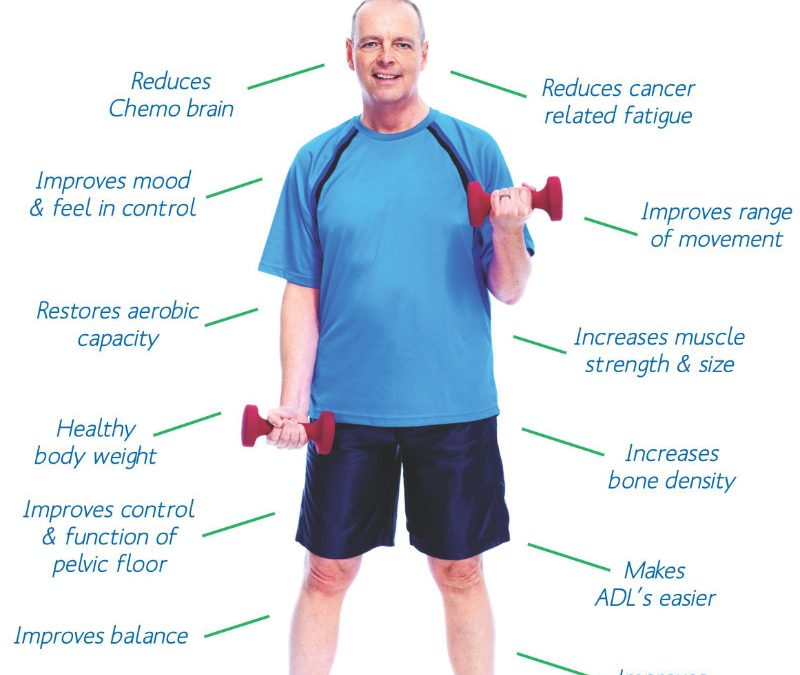Cancer and Exercise
Adapted from a post by Sandy Turner, RKin, Minto-Mapleton FHT
More and more research supports exercise’s physical and mental benefits along the cancer journey. The benefits of exercise on symptom management and recovery are exciting. Many international cancer societies have recommended exercise as supportive therapy for the past 10 years or more.
Since many Canadians will develop cancer in their lifetime, let’s take a closer look at this helpful tool. EXERCISE!
When is it helpful?
Exercise and movement are safe and beneficial at any stage of the cancer experience. From pre-diagnosis or prevention; through pre-, during, and post-treatment; into rehab; and in the transition from patient to cancer survivor, exercise and movement play a vital role. Along each stage, the recommendations will vary, but the benefits remain.
What are the benefits?
Exercise and movement can help return a sense of control to the person undergoing cancer treatment. It changes the focus to the positive, on what one CAN do. All movement should feel GOOD…do what feels good. Keep it simple in the beginning. Remember that movement is possible and important. The most important benefit among cancer patients and survivors is the movement’s positive effect on cancer-related fatigue (CRF). Almost all people undergoing cancer treatment will experience CRF. CRF is often described as the ‘stop you in your tracks’ type of low energy that interferes with usual functioning, unlike everyday fatigue, and can be debilitating and distressing. However, not every person will discuss treatment options for fatigue with their medical team. Many patients with CRF will need some treatment for CRF, and exercise is a critical tool in fatigue management.
What are the goals of exercise for people with cancer?
The general goals of an exercise plan during cancer treatment include the following:
- reducing strength loss;
- maintaining bone health;
- diminishing treatment side effects;
- and improve quality of life.
Each person will have unique needs, and their program should be tailored based on their history, cancer, treatment and individual needs and preferences. The guidelines for exercise are different for people going through cancer treatment. They include 90 minutes of moderate cardio exercise per week, two sessions of strength exercises a week and flexibility exercises most days of the week. Rest and recovery are also essential. Active rest days should also be included.
It is essential to listen to your body and slowly build up to these guidelines. Avoid overdoing it and understand that moving more is the main goal in the beginning. People are often surprised at how helpful movement and ‘mild’ levels of exercise are on their well-being and in managing their symptoms. As people move more, they can continue to work toward a regular home-based exercise program.
How much should you start with?
Activity levels in patients living with and beyond cancer are pretty low. Start by doing what you can, when you can. Think ‘some’ is good, ‘more’ is better, but always listen to your body. A useful way to do this is by tracking energy and fatigue levels. On a 1-10 scale, rate your fatigue and energy levels before and after your activity. Be mindful and take note of any changes you might be noticing. Based on this information, be prepared to change the intensity or duration of your planned workout. Watch as your fatigue and energy levels change over time, and use this to foster motivation for your program. Be sure to embrace maintenance as a positive during your experience when needed.
How to get started?
Reported barriers were people being unsure of what to do or unaware of local programs or support they can access. Working with a Registered Kinesiologist can help! Upper Grand Family Health Team has registered kinesiologists. Talk to your family doctor’s office, or call us to get started!
For more information about any of the free services offered by the Upper Grand Family Health Team, visit our website at www.uppergrandfht.org or call our Fergus office at 519-843-3947. Like us on Facebook (UpperGrandFHT) or follow us on Instagram (uppergrandfht) for tips and information on upcoming programs and events in the area!






